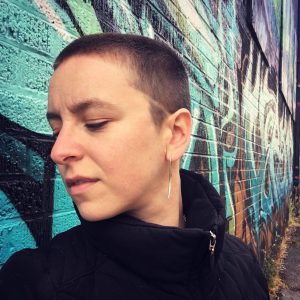What brought you to astrology?
Being grounded! No seriously! My parents grounded me for months at the beginning of my sophomore year of high school. My German teacher, and incidentally a former WSAA president, Gary Lorentzen saw how upset I was about it and asked me about my birth data. The next day after class, he handed me a printout of my natal chart (which I still have!), suggested some books to get at Powell’s Books, and said if I have any questions about all of it, ask him after school. And so it began… Also, my computer also got taken away, so I had to learn how to do charts from scratch from day one. I didn’t use a computer to do charts until about a year later.
Why do you practice astrology? What makes it juicy for you?
I practice astrology because it challenges the dominant ways people currently perceive “reality” in society, and astrology happens to be one of the most human ways we can look at and understand what is going on around us. My fierce dedication to astrology is hopefully infectious and gives others pause to think about the world in new ways when they encounter me and my work. And really, I think deep down astrology is actually practicing me. It is my calling. I cannot NOT do it.
What is your specialty, or focus?
My main project at the moment is to translate primary sources published by German astrologers and astrological organizations in the early twentieth century into English. So far I have one book published and another in utero, all supported by generous members of our community through my Patreon project. My deepest desire is to be a bridge between the community now and that community then so that we may understand ourselves and our lineage better. Surprisingly, they are still having the same conversations we are having now, almost as if we haven’t gotten very far. Once we read how people one hundred years ago were having our same struggles, we might be able to shift our focus to actually solving them.
In terms of practice, I tend toward traditional techniques, and yet I possess a deeply irreverent streak, so I also entertain astrologies that challenge tradition.
Is there a planet, sign, or aspect you’ve been exploring lately that represents an archetype or energy that feels important to you right now?
In my research a few topics have gripped my attention lately, but the one that stands out the most to me is the cosmology of the Uranian transneptunians, which has not sufficiently been translated into English. Last summer I spoke about the cosmology of the transneptunians at the University of Wales’s Sophia Centre conference in the UK. My article stemming from the talk should be appearing through Sophia Centre Press some time later in 2018.
What is your picture of astrology in the future?
I would like to see much more translation of current and older texts from many more languages than just Greek, Latin, and Arabic. Cross-cultural transfer is so important, both historically and today. We’ve made great strides in the last thirty years, and just imagine what another thirty could bring! Especially when we add new languages into the mix and decentralize ourselves from the hegemony of the Greek narrative.
Are there any additional comments you would like to make about your lecture and workshop?
The topic of planetary hours gets us back to a primal, magical form of astrology that can be put to immediate use.
If you discovered a new planet, or asteroid, what would you name it and why?
Together with many in our community, I have discovered heaps of asteroids, called Fantasteroids. My favorites are “Studpuppy” (discovered at 1 Pisces, but exalting at 3 Pisces) and “Ancient Man with No Plan” (discovered at 26 Sagittarius, the galactic center!). You can read more about them at www.fantasteroids.com Where did this idea come from? As I approached my 30s, I realized that Marc Edmund Jones was not much older than me when he sat down in an afternoon in San Diego and channeled the Sabian symbols, now widely accepted as truth; and not much older than Alfred Witte who intuited hypothetical Transneptunian planets that are also still in heavy rotation in some areas of our community. So I tried discovering hypothetical asteroids. The results so far have been amazing.
Jenn Zahrt
 Jenn Zahrt PhD is an author, publisher, and historian of astrology. She has taught and lectured in the United States, the United Kingdom, Canada, Germany and India. Zahrt publishes scholarship on astrology, esotericism, and more through the Sophia Centre Press and Revelore Press. She is currently translating astrological sourceworks from Weimar Germany into English – you may support her in this work through Patreon. Zahrt bases her client practice out of Seattle, WA. jz@revelore.press www.jennzahrt.com
Jenn Zahrt PhD is an author, publisher, and historian of astrology. She has taught and lectured in the United States, the United Kingdom, Canada, Germany and India. Zahrt publishes scholarship on astrology, esotericism, and more through the Sophia Centre Press and Revelore Press. She is currently translating astrological sourceworks from Weimar Germany into English – you may support her in this work through Patreon. Zahrt bases her client practice out of Seattle, WA. jz@revelore.press www.jennzahrt.com